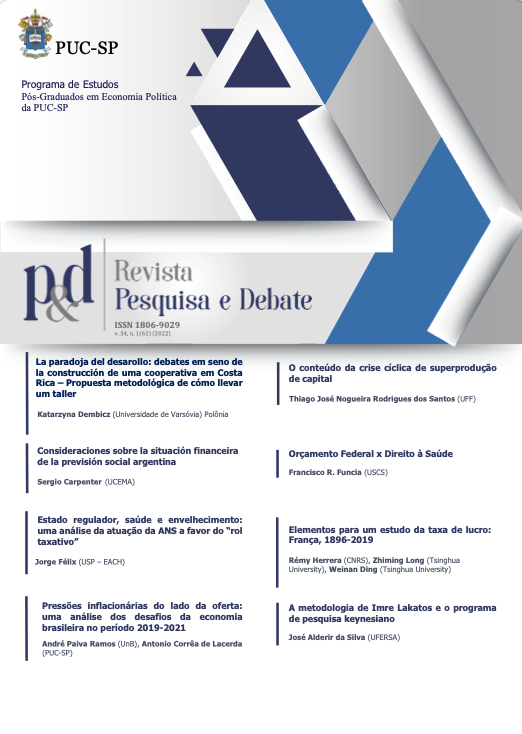A metodologia de Imre Lakatos e o Programa de Pesquisa Keynesiano
DOI:
https://doi.org/10.23925/1806-9029.v34i1e59734Palavras-chave:
Filosofia da Ciência, Keynes, Demanda EfetivaResumo
O objetivo deste artigo é realizar uma aplicação da metodologia de Programas de Pesquisa Científica de Lakatos ao programa de pesquisa keynesiano. O artigo inicia com uma breve discursão sobre os principais autores da filosofia da ciência e em seguida expõe o falseacionismo metodológico de Lakatos. A teoria clássica foi predominante na ciência econômica até a década de 1930, quando surgiu Keynes modificando o que até então era denominada por economia política. Keynes provocou uma revolução na teoria econômica, abandonando quase que por completo os teoremas da teoria clássica e criando um novo campo do conhecimento, a macroeconomia. Esse conjunto de teorias e conceitos e sua aplicação em uma economia monetária constituíram um novo programa de pesquisa na economia, que nos conceitos de Lakatos, pode ser considerado teoricamente e empiricamente progressivo.
Referências
BACKHOUSE, R. E. The Lakatosian legacy in economic methodology. In: BACKHOUSE, R. E. (ed.). New Directions in Economic Methodology. London: Routledge, 1994.
BLAUG, M. Kuhn versus Lakatos, or paradigms versus research programmes in the history of economics. History of Political Economy, v. 7, n. 4, p. 399-433, 1975.
CHALMERS, A. F. O que é ciência afinal? São Paulo: Brasiliense, 1991.
CHICK, V. Macroeconomia Após Keynes. Forense Universitária, Rio de Janeiro: 1993.
COATS, A. W. (1969). Is there a structure of scientific revolutions in economics?. Kyklos, 22(2), 289-296.
DILLARD, D. A Teoria Econômica de John Maynard Keynes. Livraria Pioneira Editora, São Paulo: 1986.
FEYERABEND, P.K. Against method: outline of an anarchistic theory of knowledge.Atlantic Highlands, NJ: Humanities Press, 1975. [Tradução para o português: Contra o método.Editora UNESP, 2007].
FRIEDMAN, M. (1953). Essays in positive economics. University of Chicago press.
GONZALEZ, Wenceslao J. Lakatos’s approach on prediction and novel facts. Theoria. Revista De Teoría, Historia Y Fundamentos De La Ciencia, v. 16, n. 3, p. 499-518, 2001.
GONZALEZ, Wenceslao J. The evolution of Lakatos’s repercussion on the methodology of economics. HOPOS: The Journal of the International Society for the History of Philosophy of Science, v. 4, n. 1, p. 1-25, 2014.
GORDON, D. F. (1965). The role of the history of economic thought in the understanding of modern economic theory. The American Economic Review, 55(1/2), 119-127.
HANDS, D. W. (2001). Reflection without rules: economic methodology and contemporary science theory. Cambridge University Press.
HANDS, D. W. (1993). Popper and Lakatos in economic methodology. In: GUSTAFSSON, B.; KNUDSEN, C.; USLAKI, M. (ed.). Rationality, institutions and economic methodology. Routledge, 1993.
Harrod, R. (1939). Na essay in dynamic theory. In: Ecomic Journal, v. 49, 1939.
HAUSMAN, D. Kuhn, Lakatos and the character of economics. In: BACKHOUSE, R. E. (ed.). New Directions in Economic Methodology. London: Routledge, 1994.
HOOVER, K. D. Why does methodology matter for economics? The Economic Journal, v. 105, n. 430, p. 715-734, 1995.
Keynes, J. M. (1930). A treatise on Money. Londres, Macmillan, 1930.
Keynes, J. M. (1936). The general theory of employment, interest and Money. Nova York, Harcourt, 1936.
KREGEL, Jan A. Economic methodology in the face of uncertainty: the modelling methods of Keynes and the Post-Keynesians. The Economic Journal, v. 86, n. 342, p. 209-225, 1976.
KUHN, T. S. A estrutura das revoluções científicas. 3ª edição. São Paulo: Perspectiva, 2000.
LAKATOS, I. History of science and its rational reconstructions. Springer Netherlands, 1971. [Tradução para o português:História da ciência e suas reconstruções racionais.Lisboa: Edições 70, 1978].
LAKATOS, I. La metodología de los programas de investigación científica. Madrid: Alianza Editorial, 1983.
LAKATOS, I. O falseamento e a metodologia dos programas de pesquisa científica. In: LAKATOS, I; MUSGRAVE, A. (orgs.). A crítica e o desenvolvimento do conhecimento. São Paulo: Editora Cultrix, p. 109-243, 1979.
LAKATOS, Imre; FEYERABEND, Paul. For and against method. In: For and Against Method. University of Chicago Press, 2010.
LAKATOS, I; MUSGRAVE, A. (orgs.) (1979). A crítica e o desenvolvimento do conhecimento. Trad. Octávio Mendes Cajado. São Paulo: Cultrix, 1979.
LATSIS, S. J. Situational determinism in economics. The British Journal for the Philosophy of Science, v. 23, n. 3, p. 207-245, 1972.
LATSIS, S. J. A research programme in economics. In: LATSIS, S. J. Method and appraisal in economics. Cambridge: Cambridge University Press, p. 1-42, 1976.
MOTTERLINI, Matteo et al. Reconstructing Lakatos a Reassessment of Lakatos' Philosophical Project and Debates with Feyerabend in Light of the Lakatos Archive. 2001.
PASINETTI, Luigi Lodovico. The principle of effective demand. 1997.
POPPER, K. R. A lógica da pesquisa científica. Editora Cultrix, 2004.
ROBINSON, Joan. The Long-Period Theory of Employment. In: An Essay on Marxian Economics. Palgrave Macmillan, London, 1966. p. 29-34.
SHACKLE, George Lennox Sharman. The years of high theory: invention and tradition in economic thought 1926-1939. Cambridge university press, 1967.
WARD, B. (1972). What’s wrong with economics?. Springer.
WEINTRAUB, E. R. Appraising general equilibrium analysis. Economics & Philosophy, v. 1, n. 1, p. 23-37, 1985.
WEISS, M. (2002). The best way to do economics: moves and countermoves in the history of economic methodology. Texto de Discussão da Duke University. Durham.
Downloads
Publicado
Como Citar
Edição
Seção
Licença
Copyright (c) 2022 Pesquisa & Debate

Este trabalho está licenciado sob uma licença Creative Commons Attribution 4.0 International License.


